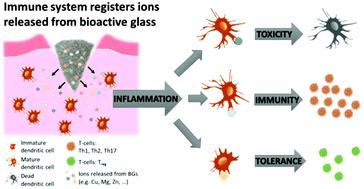当前位置:
X-MOL 学术
›
Biomater. Sci.
›
论文详情
Our official English website, www.x-mol.net, welcomes your feedback! (Note: you will need to create a separate account there.)
Cu, Zn doped borate bioactive glasses: antibacterial efficacy and dose-dependent in vitro modulation of murine dendritic cells
Biomaterials Science ( IF 6.6 ) Pub Date : 2020-03-31 , DOI: 10.1039/c9bm01691k Katharina Schuhladen 1, 2, 3, 4, 5 , Lena Stich 5, 6, 7, 8 , Jochen Schmidt 3, 4, 5, 9, 10 , Alexander Steinkasserer 5, 6, 7, 8 , Aldo R. Boccaccini 1, 2, 3, 4, 5 , Elisabeth Zinser 5, 6, 7, 8
Biomaterials Science ( IF 6.6 ) Pub Date : 2020-03-31 , DOI: 10.1039/c9bm01691k Katharina Schuhladen 1, 2, 3, 4, 5 , Lena Stich 5, 6, 7, 8 , Jochen Schmidt 3, 4, 5, 9, 10 , Alexander Steinkasserer 5, 6, 7, 8 , Aldo R. Boccaccini 1, 2, 3, 4, 5 , Elisabeth Zinser 5, 6, 7, 8
Affiliation

|
Among emerging biomaterials, bioactive glasses (BGs) are being widely explored for various applications in tissue engineering. However, the effects of BGs (in particular BG ionic dissolution products) on immune cells and specifically on dendritic cells (DCs), which are the most potent antigen-presenting cells of the immune system, have not been previously investigated in detail. Such interactions between BGs and DCs must be assessed as a novel biocompatibility criterion for biomaterials, since, with the increased application possibilities of BGs, the modulation of the immune system may induce potential complications and undesired side effects. Indeed, the effects of BG exposure on specific immune cells are not well understood. Thus, in this study we investigated, for the first time, the effect of borate BGs doped with biologically active ions on specific immune cells, such as DCs and we further investigated the antibacterial properties of these borate BGs. The compositions of the borate BGs (B3) were based on the well-known 13–93 (silicate) composition by replacing silica with boron trioxide and by adding copper (3 wt%) and/or zinc (1 wt%). By performing an agar diffusion test, the antibacterial effect depending on the compositions of the borate BGs could be proved. Furthermore we found a dose-dependent immune modulation of DCs after treatment with borate BGs, especially when the borate BGs contained Zn and/or Cu. Depending on the ion concentration and the rise in pH, the phenotype and function of DCs were modified. While at low doses B3 and Zn-doped B3 BGs had no impact on DC viability, Cu containing BGs strongly affected cell viability. Furthermore, the surface expression of DC-specific activation markers, such as the major histocompatibility complex (MHC)-II, CD86 and CD80, was modulated. In addition, also DC mediated T-cell proliferation was remarkably reduced when treated with high doses of B3–Cu and B3–Cu–Zn BGs. Interestingly, the release of inflammatory cytokines increased after incubation with B3 and B3–Zn BGs compared to mock-treated DCs. Considering the essential role of DCs in the modulation and regulation of immune responses, these findings provide first evidence of phenotypic and functional consequences regarding the exposure of DCs to BGs in vitro.
中文翻译:

铜,锌掺杂硼酸盐生物活性玻璃:小鼠树突状细胞的抗菌效果和剂量依赖性体外调节
在新兴的生物材料中,人们广泛探索了生物活性玻璃(BG)在组织工程中的各种应用。然而,先前尚未详细研究过BG(特别是BG离子溶解产物)对免疫细胞,特别是对树突细胞(DC)的作用,树突细胞是免疫系统中最强的抗原呈递细胞。BG和DC之间的这种相互作用必须作为一种新的生物材料生物相容性标准进行评估,因为随着BG应用可能性的增加,免疫系统的调节可能引起潜在的并发症和不良副作用。确实,BG暴露对特定免疫细胞的影响尚不十分清楚。因此,在这项研究中,我们首次进行了调查,掺有生物活性离子的硼酸盐BG对特定免疫细胞(例如DC)的影响,我们进一步研究了这些硼酸盐BG的抗菌性能。硼酸盐BG(B3)的组成基于众所周知的13–93(硅酸盐)组成,方法是用三氧化硼代替二氧化硅,并添加铜(3 wt%)和/或锌(1 wt%)。通过进行琼脂扩散试验,可以证明取决于硼酸盐BG的组成的抗菌效果。此外,我们发现在用硼酸盐BG处理后,DC的剂量依赖性免疫调节,特别是当硼酸盐BG包含Zn和/或Cu时。根据离子浓度和pH值的升高,修饰了DC的表型和功能。虽然低剂量的B3和Zn掺杂的B3 BG对DC的生存能力没有影响,含铜的BG强烈影响细胞活力。此外,DC特异性激活标志物(如主要组织相容性复合物(MHC)-II,CD86和CD80)的表面表达受到调节。此外,当用大剂量的B3-Cu和B3-Cu-Zn BGs处理时,DC介导的T细胞增殖也明显减少。有趣的是,与模拟处理的DC相比,与B3和B3-Zn BG孵育后,炎性细胞因子的释放增加了。考虑到DC在免疫应答的调节和调节中的重要作用,这些发现为DC暴露于BG中提供了表型和功能后果的初步证据。此外,当用大剂量的B3-Cu和B3-Cu-Zn BGs处理时,DC介导的T细胞增殖也明显减少。有趣的是,与模拟处理的DC相比,与B3和B3-Zn BG孵育后,炎性细胞因子的释放增加了。考虑到DC在免疫应答的调节和调节中的重要作用,这些发现为DC暴露于BG中提供了表型和功能后果的初步证据。此外,当用大剂量的B3-Cu和B3-Cu-Zn BGs处理时,DC介导的T细胞增殖也明显减少。有趣的是,与模拟处理的DC相比,与B3和B3-Zn BG孵育后,炎性细胞因子的释放增加了。考虑到DC在调节和调节免疫应答中的重要作用,这些发现为DC暴露于BG中提供了表型和功能后果的初步证据。体外。
更新日期:2020-04-24
中文翻译:

铜,锌掺杂硼酸盐生物活性玻璃:小鼠树突状细胞的抗菌效果和剂量依赖性体外调节
在新兴的生物材料中,人们广泛探索了生物活性玻璃(BG)在组织工程中的各种应用。然而,先前尚未详细研究过BG(特别是BG离子溶解产物)对免疫细胞,特别是对树突细胞(DC)的作用,树突细胞是免疫系统中最强的抗原呈递细胞。BG和DC之间的这种相互作用必须作为一种新的生物材料生物相容性标准进行评估,因为随着BG应用可能性的增加,免疫系统的调节可能引起潜在的并发症和不良副作用。确实,BG暴露对特定免疫细胞的影响尚不十分清楚。因此,在这项研究中,我们首次进行了调查,掺有生物活性离子的硼酸盐BG对特定免疫细胞(例如DC)的影响,我们进一步研究了这些硼酸盐BG的抗菌性能。硼酸盐BG(B3)的组成基于众所周知的13–93(硅酸盐)组成,方法是用三氧化硼代替二氧化硅,并添加铜(3 wt%)和/或锌(1 wt%)。通过进行琼脂扩散试验,可以证明取决于硼酸盐BG的组成的抗菌效果。此外,我们发现在用硼酸盐BG处理后,DC的剂量依赖性免疫调节,特别是当硼酸盐BG包含Zn和/或Cu时。根据离子浓度和pH值的升高,修饰了DC的表型和功能。虽然低剂量的B3和Zn掺杂的B3 BG对DC的生存能力没有影响,含铜的BG强烈影响细胞活力。此外,DC特异性激活标志物(如主要组织相容性复合物(MHC)-II,CD86和CD80)的表面表达受到调节。此外,当用大剂量的B3-Cu和B3-Cu-Zn BGs处理时,DC介导的T细胞增殖也明显减少。有趣的是,与模拟处理的DC相比,与B3和B3-Zn BG孵育后,炎性细胞因子的释放增加了。考虑到DC在免疫应答的调节和调节中的重要作用,这些发现为DC暴露于BG中提供了表型和功能后果的初步证据。此外,当用大剂量的B3-Cu和B3-Cu-Zn BGs处理时,DC介导的T细胞增殖也明显减少。有趣的是,与模拟处理的DC相比,与B3和B3-Zn BG孵育后,炎性细胞因子的释放增加了。考虑到DC在免疫应答的调节和调节中的重要作用,这些发现为DC暴露于BG中提供了表型和功能后果的初步证据。此外,当用大剂量的B3-Cu和B3-Cu-Zn BGs处理时,DC介导的T细胞增殖也明显减少。有趣的是,与模拟处理的DC相比,与B3和B3-Zn BG孵育后,炎性细胞因子的释放增加了。考虑到DC在调节和调节免疫应答中的重要作用,这些发现为DC暴露于BG中提供了表型和功能后果的初步证据。体外。

























 京公网安备 11010802027423号
京公网安备 11010802027423号